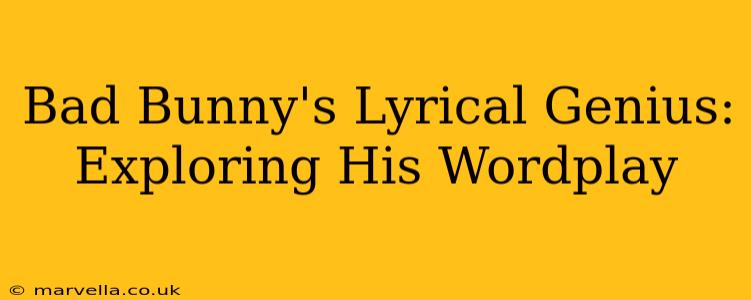Bad Bunny, the Puerto Rican trap and reggaeton superstar, isn't just a charismatic performer; he's a lyrical architect. His music transcends simple catchy tunes, showcasing a mastery of wordplay, clever metaphors, and social commentary that sets him apart in the Latin music scene and beyond. This exploration delves into the intricacies of Bad Bunny's lyrical genius, highlighting his unique style and the impact it has on his global fanbase.
What Makes Bad Bunny's Lyrics Unique?
Bad Bunny's lyrical uniqueness stems from several factors. He masterfully blends Spanish slang, colloquialisms, and inventive neologisms (newly coined words) to create a vibrant and authentic voice. He's not afraid to experiment with rhythm and rhyme schemes, often defying traditional structures to craft a sound that's both innovative and infectious. This approach allows him to connect with a broad audience, both those who grew up speaking Spanish and those discovering the language through his music. His lyrics aren't just about partying; they often touch upon social issues, relationships, and self-identity, adding depth and complexity to his already captivating melodies.
How Does Bad Bunny Use Wordplay?
Bad Bunny's wordplay is a key element of his artistry. He frequently employs:
-
Double entendres: He uses words or phrases with multiple meanings to create layers of interpretation, adding a playful ambiguity to his lyrics. This keeps the listener engaged, prompting repeated listens to fully grasp the nuances.
-
Metaphors and Similes: He crafts vivid imagery through striking metaphors and similes, painting pictures with words and transporting the listener into his world. His metaphors are often unexpected and brilliantly executed, adding a layer of artistic depth to his songs.
-
Puns: Bad Bunny skillfully incorporates puns, leveraging the phonetic similarities between words to create humorous and clever effects. These puns often add a layer of cultural context, further enriching the listening experience.
-
Internal Rhyme: He uses internal rhyme, placing rhyming words within the same line, creating a sense of flow and musicality that’s both captivating and unique.
Does Bad Bunny's Music Have Deeper Meanings?
Yes, absolutely. While many of his songs are undeniably upbeat and party-centric, Bad Bunny often incorporates subtle and sometimes overt social commentary. His lyrics frequently touch upon themes of:
-
Masculinity: He challenges traditional notions of masculinity, presenting a more fluid and complex portrayal of male identity.
-
Social Inequality: He addresses issues of social injustice and inequality within Puerto Rican society and beyond.
-
Relationships and Love: While he sings about love and romance, his depictions are often realistic and nuanced, moving beyond simplistic portrayals of relationships.
-
Self-Identity: He explores his own personal journey of self-discovery and identity formation, connecting with listeners who share similar experiences.
What Are Some Examples of Bad Bunny's Lyrical Genius?
Analyzing specific lyrics from his songs would require a deep dive into individual tracks, but listening closely reveals his mastery. Take, for instance, his use of slang and colloquialisms—phrases that resonate deeply with his target audience. The clever wordplay often goes beyond surface-level understanding, demanding closer attention to reveal the multiple layers of meaning. This is what elevates his music from simple pop to a truly artistic expression.
What Influences Bad Bunny's Lyrical Style?
Bad Bunny's lyrical style is a melting pot of influences, drawing inspiration from traditional Puerto Rican music, trap, reggaeton, and other genres. His upbringing and experiences in Puerto Rico deeply shape his lyrical content and delivery, while his global exposure and collaborations have further expanded his creative palette.
Conclusion:
Bad Bunny’s lyrical genius lies not just in his technical skill but in his ability to connect deeply with his audience. He utilizes language in a creative, innovative, and socially conscious way, making him more than just a musician; he’s a cultural icon and a master storyteller. His wordplay, layered meanings, and incorporation of social commentary solidify his position as a truly unique and influential artist in the global music landscape.

